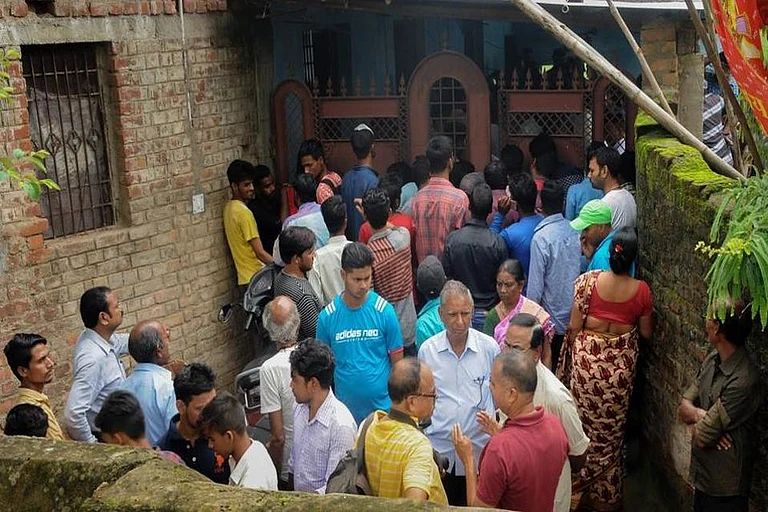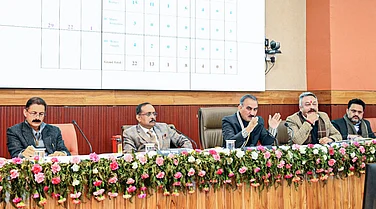Doomsday Cometh
An order by Justice S.R. Sen of the Meghalaya High Court, issued while disposing of a petition by someone denied a certificate by the state government, has urged the prime minister to bring in legislation allowing non-Muslims living in Pakistan, Bangladesh and Afghanistan to come to India and claim Indian citizenship. The 37-page order, which the judge directed to be sent to the PM, the home minister and the law minister, asserts that India should have been declared a Hindu nation long ago, and that “I make it clear that nobody should try to make India another Islamic country, otherwise it will be a doomsday for India and the world.”

Bada Madam In Assam
Meet the new boss, not quite the same as the old boss. Manju Baruah, 43, is the manager of Apeejay Tea’s Hillika Tea Estate, located in upper Assam’s Dibrugarh district. It’s reportedly a first for the state’s tea estates—women have held posts such as senior assistant manager and welfare officer, but there has never been a female manager before. Baruah, formerly a welfare officer herself, was quoted as saying, “I am often addressed as ‘bada madam’. It is the alternative to ‘bada saheb’, the way the boss in a tea garden is traditionally addressed. Sometimes, the workers call me ‘sir’. I rather enjoy it.” Bada Madam, who rides a motorcycle around the 633-hectare estate, added that “A woman manager is certainly a disruption in the traditional structure in a tea garden, but it’s a disruption of a good kind.”

The Spirit Is Illicit
It was a seemingly solid plan mooted in the wake of the floods—raise the excise duty on liquor in Kerala by around 10 per cent to acquire additional funds for the relief efforts. But the state’s ever-resourceful imbibers have found a way to cut that particular corner, by resorting to illicitly brewed liquor. Excise investigators have seized around 3.5 lakh litres of wash this year, with around half having been made after the floods in August. It’s a bit higher than the average of 75,000 to one lakh litres per year, to put it mildly. Excise commissioner Rishiraj Singh told a newspaper, “The department has promptly tightened the noose.... We have even arrested a teacher for brewing illicit liquor in Alappuzha, and she is now in judicial custody.” Brewing equipment available online seems to have made things easier.

Elephants’ Graveyard
Sri Lanka isn’t the safest place to be if you’re an elephant. An 11-year-old male calf, with no history of troubling people, was shot in the head at Udawalawe National Park at the start of this month; the authorities have been trying to find the shooter. “If an elephant calf inside a national park is shot dead, then where else can the animal be safe in our country?” asks Jayantha Jayawardena, elephant expert and managing trustee of the Biodiversity and Elephant Conservation Trust. Nowhere, it seems. Around 277 elephants have had fatal mishaps in the country this year, with causes including electrocution, accidents on railway tracks, traps and people using guns to protect their crops. A proper conservation strategy is required, but authorities have been “just firefighting” and “the human element has been negative”, claims Jayawardena.

Their Percussion Mission
They’ve performed in front of Amitabh Bachchan in Kaun Banega Crorepati. They “fly in aeroplanes, visit faraway cities and live in good hotels.” And it’s a far cry from where they started. The Nari Gunjan Sangam Mahila Band, a band of ten Dalit women from landless families in Bihar, made a name as drummers at weddings and festivals. The group, formed two-and-a-half years ago with the aid of social activist Sudha Varghese, earns around Rs 2.2 lakh a year—vital income that has made members’ lives easier and helped them support their families, and build houses; objecting husbands have been silenced through the handing over of the moolah.
The Dead Sea Bags
No, that’s not some new or recently unearthed Tintin album. The Dead Sea is famous for being possible to float in without swimming and, of course, for the Dead Sea Scrolls. It is also infamous for being highly polluted. Now, a group of volunteers in Nepal are using it as an example to raise awareness about plastic waste in the oceans, by tying 1,00,000 used plastic bags (a world record attempt for the largest plastic bag sculpture) on a metal grid 65 feet long and 16 feet tall, shaped like the Dead Sea, in Kathmandu’s city centre. Their slogan: “One Dead Sea is enough for us.”
Fowl Prey Hounded
It’s the typical rural horror story: livestock killed by mysterious nocturnal attackers with inexplicable methods. It started in Manipur’s Churachandpur and Kakching districts in October, with ducks and chickens found slashed and missing their entrails, but with no sign of fangs or claws, no blood trail. Goats, cattle and dogs were killed in later attacks, causing panic, especially after similar cases were reported in four other districts. One woman claimed she was attacked by a flying creature, spawning alien theories. But a team from the Wildlife Institute of India offered a prosaic explanation: stray dogs hunting in packs at night. But this doesn’t account for the initial cases. Theorists await the lab results!

Afghan Volte Face
Often criticised for its role of being a major contributor to Afghanistan’s instability, the Pakistani leadership now sees a way where it should be regarded as the main facilitator for peace and stability in the war-torn nation.
On Tuesday, Pakistani PM Imran Khan highlighted the part his country is playing in negotiations between the United States and the Afghan Taliban, whose first round of talks ended in the UAE earlier this week. In a tweet from his official account, Imran Khan said his government will do what it can do to “further the peace process” and end “almost three decades of suffering of the brave Afghan people.”
The US and Afghan Taliban representatives held their first round of talks in Abu Dhabi where Pakistan, Saudi Arabia and UAE were also present. The attempt of the current negotiations between the two sides is to find a settlement of the war in Afghanistan. Though no statements were made by the participants, Pakistan’s foreign office spokesman Mohammed Faisal officially announced the start of the talks through a tweet.
This was the third meeting between the Taliban and US officials since the appointment of ambassador Zalmay Khalilzad as US special envoy for peace and reconciliation in Afghanistan.
However, it was the first meeting sponsored by Islamabad and also the first outside Doha, which hosts Taliban’s political office and was the venue of the earlier two rounds. It is believed that the latest meeting was convened outside Qatar to underscore Pakistan’s role in arranging it and at the same time allowing the participation of the UAE and Saudi Arabia, both of whom had last year cut diplomatic ties with Doha.
Khalilzad led the US, whereas the Taliban were represented at the talks by their ‘political negotiators’ from Qatar office.
Pakistan had arranged the meeting after US President Donald Trump sought its help a fortnight ago. But the Afghan government was not represented at Monday’s meeting because the Taliban have stood firmly on not talking to the administration in Kabul, whom they call the puppet regime, and insisted on talking directly to the US.
Could this then be the beginning of the end of Pakistan’s isolation and the first signs of a serious rapprochement in Islamabad-Washington ties?
Illustrations by Saahil



















.png?w=200&auto=format%2Ccompress&fit=max)






